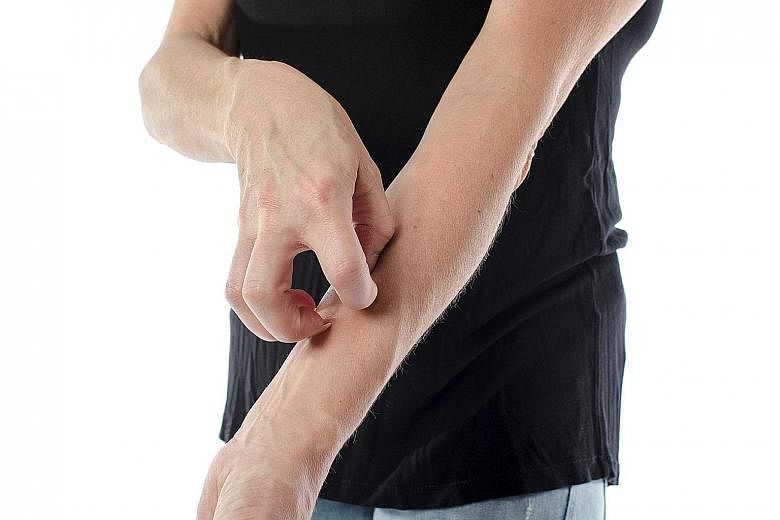For as long as he can remember, Mr Andre D'Rozario, 19, has lived with regular episodes of severe itching.
He suffers from atopic eczema, an angry and itchy rash which flares up every now and then. It can appear all over his body, or just on certain parts like his elbow, torso, forearms, face and neck.
"It has prevented me from going to school many times," said the teen, who is studying digital animation at Lasalle College of the Arts.
Last year, he suffered a flare-up that was so bad that he landed in hospital for a week.
Eczema, also called dermatitis, is a common chronic dry skin condition. In mild cases, the skin is scaly, red and itchy. If it is severe, the skin can weep, crust, blister or bleed. Sufferers may be unable to resist the urge to scratch, which causes the skin to split and bleed, leaving it open to infection.
In recent years, more people have been diagnosed with it. This year, KK Women's and Children's Hospital (KKH) has seen, on average, eight to 10 new cases a day, up from five to eight last year, said Dr Mark Koh, head and consultant at the hospital's dermatology service. He expects the numbers to rise as more people become aware of the one-stop paediatric dermatology service set up by the hospital in 2013.
Eczema is also the top skin condition treated at National University Hospital (NUH) and National Skin Centre, which has seen more children under the age of five with it, said consultant Madeline Ho.
The disease commonly starts in childhood and often improves over time, though it can also last into adulthood or show up then. There is no cure for it.
It affects up to 20 per cent of children of school-going age here, said Dr Liew Hui Min, an associate consultant at KKH's dermatology service.
Atopic eczema is the most common form and those affected may also have other allergic conditions like asthma. In healthy skin, the cells are plumped up with water, forming a barrier against damage and infection. Fats and oils in the skin help to retain moisture, maintain body temperature and prevent harmful substances or bacteria from entering our bodies, according to the National Eczema Society in Britain.
"If you have eczema, your skin may not produce as much fats and oils as other people's, and will be less able to retain water," it said.
The cause of eczema is not fully understood, but atopic eczema appears to be caused by genetic and environmental factors, it added.
Here, it is mainly due to the hot, humid weather and house dust mites, which thrive better in such an environment, said Dr Liew.
Said Dr Derrick Aw, a senior consultant at NUH's University Dermatology Clinic: "The cornerstone of the treatment and prevention of eczema is regular, adequate moisturising, to manage inflammation and its symptoms."
Studies show that the use of moisturisers early in life - for example, from birth - can prevent the onset of eczema in babies who are predisposed to getting it, such as those with a strong family history of the skin disorder, said Dr Koh.
For Mr D'Rozario, eczema has also caused him stress, which then makes it worse. "I am worried about how it will affect my life - for instance, my ability to get hired."
Indeed, in moderate to severe cases of eczema, the patient's quality of life can be severely affected, leading to family, relationship and psycho-social issues, said Dr Liew.
Anger management issues, absenteeism from school and poor school performance are often observed in children with eczema, she said.
Last year, Mr D'Rozario started doing art therapy at KKH's multidisciplinary chronic eczema clinic to cope with his anxiety. It has helped.
"I don't flare up so much, maybe an average of once or twice a month. It used to be about four times a month," he said.
Research being done now may offer more hope. Dr Aw said a new antibody called dupilumab is undergoing a phase three clinical trial around the world, including Singapore, and could be available in three to five years' time.
This is a "non-steroid treatment that controls moderate to severe atopic eczema, and is administered monthly by injection", he said.
Said Dr Koh: "It has not been tested in children but is something new that we can look forward to."


